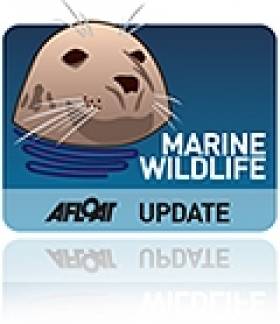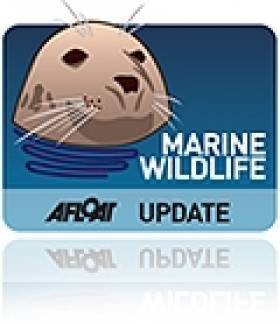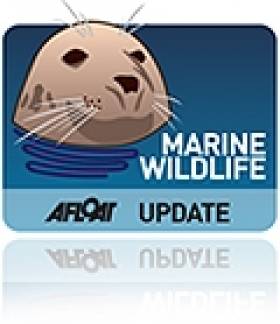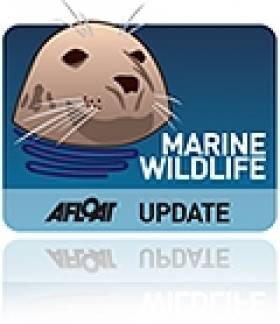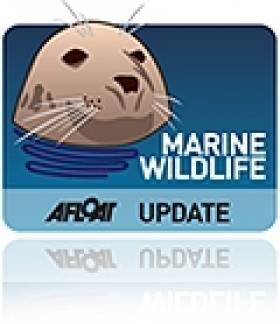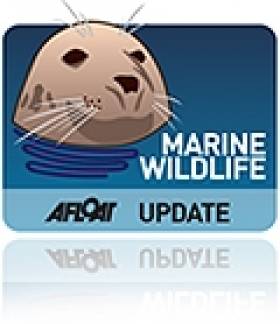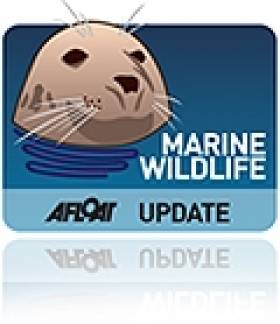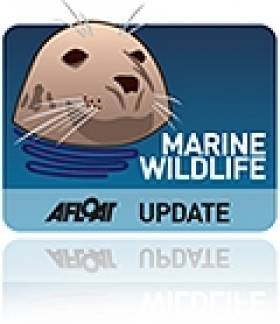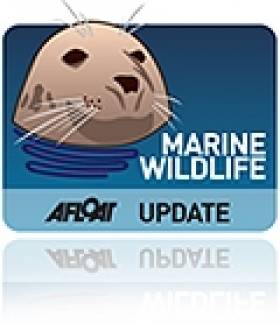Displaying items by tag: fin whale
Whale Watchers Rejoice As Boomerang Comes Back With A Humpback Mate
#MarineWildlife - The humpback whale known as Boomerang is back – and this time he may have found a mate, according to The Irish Times.
Last spotted almost exactly a year ago off the south coast at the Cork-Waterford border, as previously reported on Afloat.ie, the humpback formally known as HBIRL3 has been spotted by the Irish Whale and Dolphin Group's Andrew Malcolm in recent days in the same location.
But this time he wasn't alone, as another humpback – HBIRL6, a female who last visited Waterford in 2008, and was previously seen with a juvenile off Co Kerry – was keeping him good company. The irish Times has more on the story HERE.
In other cetacean news, the large whale carcass that washed up on Portstewart Strand earlier this month is believed to have died of natural causes.
Originally confirmed as the remains of an adult female sei whale, the 43-foot behemoth has now been identified as a fin whale, most likely a juvenile, as the Belfast Telegraph reports.
Though the cause of death is "inconclusive", it is thought that due to its peeling skin, thin blubber layer and reduced muscle mass, the whale was already dead for days and decomposing before it washed up on the North Coast beach on 4 October.
Fin whales are the second largest mammal in the world's oceans behind only the blue whale.
Irish Air Corps Captures Video Of Breaching Fin Whale
#MarineWildlife - Check out this wonderful video captured by the Irish Air Corps earlier this week featuring the uncommon sight of a fin whale breaching some 150 miles off Mizen Head in West Cork.
Fin whales, the second largest of the ocean's creatures after the giant blue whale, are a regular sight in Irish waters but are rarely seen breaching here.
According to the Irish Whale and Dolphin Group (IWDG): "The diagnostic white right lower jaw and tall blow confirms this to be a fin whale, although breaching is a behaviour typically associated with other species such as humpback and minke whales.
"There is however evidence that fin whales in the Mediterranean do breach occasionally, so it remains a mystery as to why this behaviour has never before been recorded here."
Achill Island Fin Whale Remains Could Be Big Heritage Attraction
#MarineWildlife - Achill Island locals have proposed that the 20-metre fin whale beached on Keel Beach over Christmas - and buried just before the New Year - be preserved in some form as a heritage attraction for the region, as the Galway Advertiser reports.
The inspiration comes from the residents of West Cork village Kilbrittain, who were successful in securing permissions to recover the buried remains of a similarly sized whale in 2009. The whale skeleton was since put on display as a big tourism draw.
Similar proposals by Baltimore locals in 2012 after a fin whale became trapped in the town's harbour were scuppered when Cork County Council dumped its remains at sea.
Achill Islander and Irish Whale and Dolphin Group (IWDG) member John O'Shea says that making an attraction out of the whale skeleton would connect people with the area's whaling history, which has changed profoundly over the past century from one of slaughter to preservation.
The Galway Advertiser has more on the story HERE.
'Fantastic Opportunity' To See Beached Fin Whale On Achill Island
#MarineWildlife - There's a "fantastic opportunity to witness the second largest animal on the planet close up" on Achill Island over the next few days after a male fin whale was stranded on Keel Beach on Christmas Eve.
The 20-metre-long marine giant live stranded on the beach but died some hours later, as the Irish Whale and Dolphin Group reports. It is as yet unknown what caused the fin whale to strand, but samples of skin, blubber, muscle and baleen have been taken for assessment.
TheJournal.ie repeats Achill Coast Guard's warning for anyone coming to see the whale to stay on the shore and not venture into the surf as the strongest storm in 15 years continues to sweep the country.
On the Radio: Trailing The Fin Whale
#MarineWildlife - Tonight's Nature on One on RTÉ Radio 1 joins the Irish Whale and Dolphin Group (IWDG) on a quest off Hook Head to find the majestic fin whale.
As TEN reports, Colin Stafford Jones was on board with the IEDG's Pádraig Whooley on a mission to track down the world's second largest animal - not only the biggest example of marine wildlife behind the incredible blue whale.
Their adventure will be broadcast tonight (Sunday 9 June) from 7pm on RTÉ Radio 1, and will be available to listen online afterwards via the Nature on One website HERE.
Baltimore Whale Remains Dumped At Sea
#MARINE WILDLIFE - The carcass of the fin whale that died after being trapped in Baltimore Harbour two months ago has been towed out to sea after its presence in a conservation area attracted complaints.
According to the Irish Examiner, disappointment has been expressed by a local group in Baltimore who hoped to salvage the skeleton of the 65ft female fin whale, the remains of which have now been towed out beyond Fastnet Rock for disposal.
Last week Afloat.ie reported on claims from local resident Tom McCarthy, among others from the Schull area, that the whale carcass was creating a "rancid oil slick" with a "horrendous smell" in Roaringwater Bay, a Special Area of Conservation for marine wildlife that houses a grey seal breeding ground.
However, the Irish Whale and Dolphin Group (IWDG) - which was working with Baltimore residents on their plan to retrieve the bones with a view to displaying the skeleton in the town - criticised the decision by Cork County Council to dump the remains.
IWDG sightings co-ordinator Pádraig Whooley pointed the finger at "vested interests" exaggerating claims about health hazards, arguing that "towing it out to sea raises the very real possibility that [it] could simply wash up on the coast again."
The Irish Examiner has more on the story HERE.
Baltimore Whale Carcass Creating 'Rancid Oil Slick' in Conservation Area
#BALTIMORE WHALE - Nine weeks after the tragic demise of the Baltimore Harbour fin whale, its carcass is still afloat off West Cork, creating a “rancid oil slick” in a special conservation area, according to a local resident.
Tom McCarthy contacted Afloat.ie with the above image of the 65ft whale carcass, which was towed out to the grey seal breeding ground off the Carthys Islands in Roaringwater Bay and has apparently been left to rot.
“It has been left here since the middle of August to decay,” says Tom. “The rancid oil slick is clearly visible and extends for over 1km on relatively still days, the smell is horrendous."
As previously reported on Afloat.ie, plans were afoot to sink the fin whale carcass that was trapped in Baltimore Harbour in mid-August and endured a harrowing few days trapped in Baltimore Harbour before it died from what's presumed to be a combination of illness and injury.
Tom McCarthy claims that the National Parks and Wildlife Service (NPWS) has washed its hands of the situation, considering the enormous marine mammal carcass to be a natural occurrence "even though the animal beached and died several miles [away and] was wrapped in a net and towed to its final resting position".
The location is in a Special Area of Conservation - yet according to Tom, no risk assessment appears to have been carried out beforehand.
"Ten minutes on the internet would show that whales are perhaps the most contaminated animals in the world," he says. "Their blubber is contaminated with persistent organic compounds such as PCBs, DDT, dioxins, etc and the internal organs such as the liver and kidneys are 'high', 'very high' or 'staggeringly high' in mercury, cadmium, chromium, etc.
"Some beached whales are found to be so contaminated the whale itself has to be considered as hazardous waste and disposed of as such."
Tom notes that the area is fished extensively for shrimp, crab, lobster and pollock, and that the rotting carcass is in close proximity to several mussel farms.
"It seems inevitable that as the whale continues to decay and is eaten whatever contaminants were present prior to death will re-enter the food chain."
He compares the current situation to a similar whale carcass disposal in Sligo last year, where the flesh was cut off and sent for incineration while the bones were marked for later skeletal recreation and sent for composting.
Regarding the West Cork whale carcass, Tom says: "Some estimates say it will take three years for the whale to completely decay."
Tom adds that he has been in contact with Cork County Council and hopes to hear on Monday about plans for a more appropriate method of disposal for the whale carcass.
Samples Taken from Baltimore Fin Whale Carcass
#MARINE WILDLIFE - The Irish Examiner reports that samples from the fin whale that stranded and died in Baltimore Harbour last week have been sent to Dublin for analysis.
Samples of skin and blubber will be tested by marine science experts at the Irish Cetacean Tissue Bank in the Natural History Museum as well as at the Marine Institute, while a student studying for a PhD on the feeding ecology of fin whales will also examine the remains.
As reported yesterday on Afloat.ie, the whale carcass has been towed out of the inner harbour as preparations are made to sink it to the seabed, where marine life such as fish and crabs will quickly strip it down to a skeleton that locals hope to put on display in the West Cork town.
A post-mortem will not be carried out by the Irish Whale and Dolphin Group (IWDG) due to lack of funding for the specialised procedure. A previous necropsy of a fin whale stranded at Courtmacsherry was funded by the US-based magazine National Geographic.
Plans to Sink Baltimore Whale Carcass and Retrieve Its Skeleton
#MARINE WILDLIFE - Plans are afoot to sink the carcass of the fin whale that died after being trapped in Baltimore Harbour last week, according to the Irish Independent.
It is being proposed that the whale's body can be wrapped in netting and sunk using old train wheels as weights.
"We're looking at putting it in the water and letting it sink to the seabed where the fish and crabs can do their work and strip the flesh from the carcass," said local diver Jerry Smith. "The end scenario would be to retrieve the skeleton from the sea bed."
It's hoped that the skeleton of the 65ft female juvenile fin whale could eventually be put on display as an educational aid and a tourist attraction for the West Cork town.
Cork County Council has taken responsibility for the disposal, as the Cork Independent reports, and the 30-tonne marine giant has already been towed to Oldcourt in the Ilen esturary.
As previously reported on Afloat.ie, calls have been made to introduce a new protocol to deal with large marine wildlife strandings.
The Irish Whale and Dolphin Group (IWDG) defended itself from criticism over the handing of the "unprecedented" incident, arguing that allowing the whale to die was the best option available under the circumstances.
The Irish Independent has more on the story HERE.
Call for Whale Stranding Protocol After Baltimore Incident
#MARINE WILDLIFE - The Cork News reports that a new protocol will be introduced to deal with large marine wildlife strandings following the public backlash over the handling of the injured and malnourished fin whale in Baltimore Harbour this week.
The 30-tonne whale died on Thursday morning after being trapped in the harbour on Tuesday. As previously reported on Afloat.ie, the whale was left to die as it was found to be too ill to be assisted back into deeper water and was too large to be euthanised with drugs.
Members of the public have complained about the 'do nothing' approach taken by experts. But Dr Simon Berrow of the Irish Whale and Dolphin Group (IWDG) defended his organisation's handling of the affair, citing the lack of protocol for such an unforseen incident.
"We are recognised as the most confident group in Ireand in dealing with dolphins and whales but as a charity, it should not be our responsibility," he said. "I don't have the authority to tell someone to shoot a whale."
Dr Berrow said he had been in talks with the Defence Forces about arranging for the distressed whale to be shot before it died, most likely from wounds sustained on sharp rocks in the harbour.
Speaking with The Irish Times, the IWDG's Padraig Whooley said: "As humans, we always think we have to intervene but wildlife rarely does better when we do. In this particular case the ‘do nothing’ approach was the only option open to us."
Whooley also criticised the "fairly shocking" level of ignorance over the incident that saw crowds continue to gather at the harbour in Baltimore even after it became clear that the whale was in significant disgress.



























